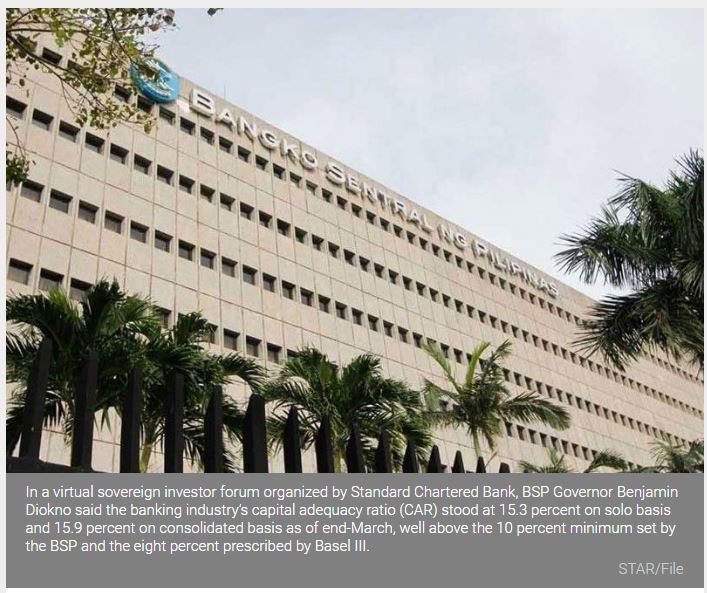Philippines: Banks can withstand pandemic impact
MANILA, Philippines — Philippine banks have sufficient buffers to survive the impact of the COVID-19 pandemic on the economy, according to the Bangko Sentral ng Pilipinas (BSP).
In a virtual sovereign investor forum organized by Standard Chartered Bank, BSP Governor Benjamin Diokno said the banking industry’s capital adequacy ratio (CAR) stood at 15.3 percent on solo basis and 15.9 percent on consolidated basis as of end-March, well above the 10 percent minimum set by the BSP and the eight percent prescribed by Basel III.
“This shows banks have ample capacity to absorb shocks,” Diokno said.
The CAR measures a bank’s capital in relation to its risk-weighted assets. The capital-to-risk-weighted-assets ratio promotes financial stability and efficiency in economic systems.
Furthermore, the BSP chief added the industry’s liquidity coverage ratio (LCR) stood at 171.4 percent, also well above the regulatory minimum of 100 percent.
Likewise, Diokno said the net stable funding ratio (NSFR) of universal and commercial banks or big banks remained steady at 129.1 percent, indicating stable funding to serve customers in the short to medium term.
“Our banking system entered the crisis with sufficient buffers, which will help it remain stable amid the crisis,” Diokno said.
Both S&P Global Ratings and Fitch Ratings earlier raised the red flag over the potential impact of the pandemic to Philippine banks as deeper economic contraction could impair the industry’s capitalization, profitability and asset quality.
For one, S&P said in a report titled “Downside risks dominate,” the economic risk trend for banks operating in the Philippines has turned negative and the risk for credit losses is now higher than previously expected with the projected deeper gross domestic product (GDP) contraction of 9.5 percent.
“In our opinion, weak economic activity and tough employment conditions will dilute the Philippine banking sector’s asset quality, earnings, and capitalization over the next two years,” S&P warned.
Diokno said the central bank’s stress tests point to favorable banking system prospects amid risks, with non-performing loans (NPLs) remaining manageable.
Latest data from the BSP showed the gross NPL ratio of Philippine banks climbed for the eight straight month to a seven-year high of 2.84 percent in August from 2.7 percent in July as restructured loans more than doubled and past due loans continued to soar.
According to the BSP, it expects an uptick in the NPL ratio in the coming months as a result of the crisis, but the increase would be manageable.
“Results show the NPLs will remain manageable, CARs will stay above the 10-percent requirement, liquidity will be sufficient, and profitability will stay intact,” the BSP chief said.
Diokno said banks have been beefing up their provisioning for bad debts, with the NPL coverage ratio standing comfortably at 107.4 percent as of end-August.
Despite the increase in loan-loss provisioning, he said banks stayed profitable as of end-June, with annualized net profit growing year-on-year by 1.8 percent.
Meanwhile, credit growth eased for the fifth straight month to hit its slowest pace in almost 14 years at 4.4 percent in August, slower than the 6.7 percent booked in July.
“This shows that despite the effects of the pandemic, there is still substantial demand for loans and appetite among banks to lend,” Diokno said.
Diokno said monetary authorities were quick and decisive in responding to the crisis as its COVID-19 response measures unleashed P1.9 trillion into the financial system.
The actions, he explained, were meant to boost market confidence and cushion economic activity, provide liquidity to complement government programs, sustain financial stability, and support continuous delivery of financial services.
“The BSP has done a lot. But our toolkit is far from exhausted, We are prepared to do more, if and when necessary,” Diokno said.
Source: https://www.philstar.com/business/2020/10/20/2050780/banks-can-withstand-pandemic-impact


 Thailand
Thailand




